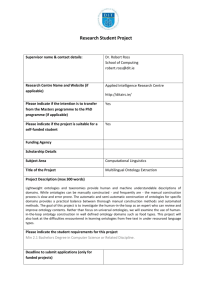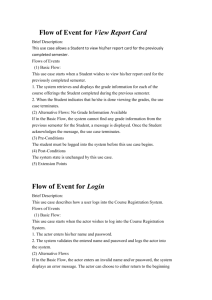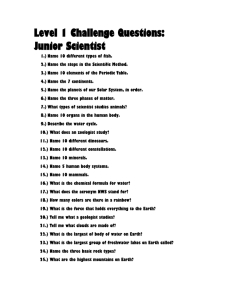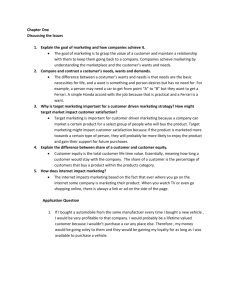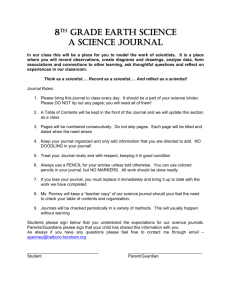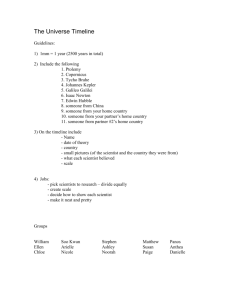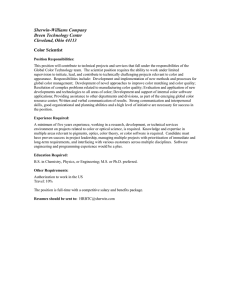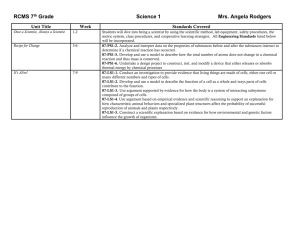Dynamic Ontologies A Framework for Service Descriptions
advertisement
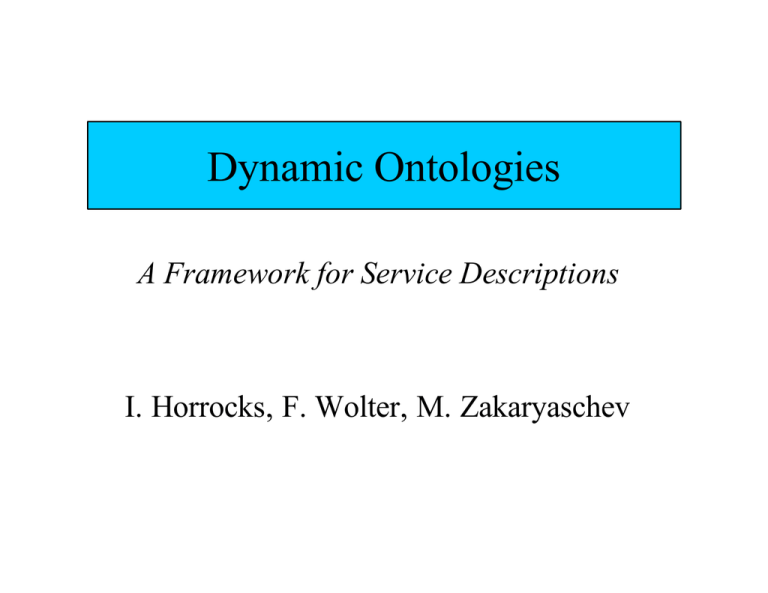
Dynamic Ontologies
A Framework for Service Descriptions
I. Horrocks, F. Wolter, M. Zakaryaschev
Describing a service
Design a formal language with a formal semantics and
efficient reasoning tools which enables the description of
the
functionality
of
grid and semantic web services
in order to support the automated discovery of services
and their composition.
We don’t….
We want to describe what a service does
(the service profile) and
1. not how the service does it;
2. not how the service is implemented.
We do…
describe the functionality of a service by means of
1. its input and/or pre-conditions: what the service
expects as input and what the service expects to be the
case.
2. its output and/or post-conditions: what the service
returns under which conditions. What is the case
after the execution of the service.
The description of the pre- and post-conditions uses a
terminology fixed by existing ontologies.
State change vs. information
A service can change the world:
Example: open a bank account; buy a book, etc.
and/or provide information:
Examples:
list the schools visited by the children of a given politician;
find DNA sequences similar to a given one.
Example: state change
Service: Opening a bank account.
Pre-conditions: costumer is eligible for a bank account in the UK,
costumer holds a proof of address
Post-conditions: costumer holds bank account. If letter from employer
available: with credit card. If no letter available: without credit card.
Domain ontology: Who is eligible for a bank account? What is a
proof of address?
Reasoning problem: Given the information provided
by the potential costumer, is the service executable?
What would be the case after the execution?
Example: state change
Our proposal: A service consists of pre- and post-conditions represented
as OWL-DL knowledge-bases with additional `if, then’ clauses in
the post-conditions. They refer to OWL-DL domain ontologies:
Pre-conditions: eligible (c), Proof of address (c )
Post-conditions: hold(c,account),
if letter(employer), then account with credit card.
if not letter(employer), then account without credit card.
Domain ontology:
eligible = permanent resident of UK.
Proof of address = utility bill.
Reasoning about a service
Given the information provided by the potential costumer
as a OWL-DL knowledge base (‘c is a permanent resident’) :
(1) Is the service executable?
(2) What is the case after the execution of the service
(projection)? Query is OWL-DL formula.
Results:
(1) Under certain restrictions for the domain ontology and the
post-conditions, (1) and (2) can be reduced to OWL-DL
reasoning tasks.
(2) DL-reasoning systems which are currently implemented
can be used.
(3) All this works for sequences of services as well.
Problems for `state change’
(1) For general OWL-DL ontologies and post-conditions
services become non-deterministic, and we face the frame
problem.
(2) Is the reduction of `executability’ and `projection’ to
standard reasoning sufficiently efficient in practice?
(3) Add time constraints.
Services providing information
A potential costumer is looking for the following service S1:
Input: Two computer scientists.
Output: List of peer-reviewed papers they co-authored.
A provider advertises the following service S2:
Input: Two scientists.
Output: List of publications they co-authored.
Domain ontology: what is a computer scientist?
What is a peer-reviewed paper? It contains:
Every computer scientist is a scientist.
Every peer reviewed paper is a publication.
Services providing information
Our preliminary proposal: Services of this type are represented as
conjunctive queries Q over OWL-DL knowledge bases:
Service S1: Input x,y and query:
Q1 = { (z,x,y) | z peer-reviewed, x author of z, y author of z,
x computer scientist, y computer scientist}
Service S2: Input x,y and query:
Q2 = { (z,x,y) | z publication, x author of z, y author of z,
x scientist, y scientist}
Observation: S2 is sufficient for S1 iff Q2 contains Q1 relative to the
domain ontology.
Services providing information
There exist algorithms checking containment of conjunctive
OWL-DL queries relative to OWL-DL knowledge bases.
Problems:
(1) Algorithms probably not yet efficient enough;
(2) not every reasoning problem relevant for service
discovery and composition is reducible in a
straightforward way to query containment.
(3) Integrate state changing and information providing
services.
